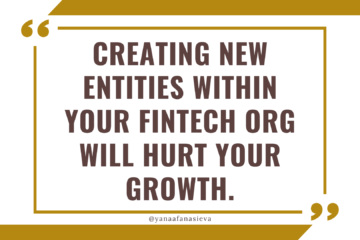Tech Startups are Terrible Channel Partners in FinTech-to-FinTech Space
I’d like to share with you my experience of enlisting, educating, and managing a number of tech-focused startups who attempted to venture into the space of distributing or selling financial products… and failed miserably in most cases.
The main reason why they try to do it is that they have great existing business relationships with the prospects and therefore believe that since they sold their own products to the end customer (an IT infrastructure, KYC, compliance, or CRM tools…), they are well-positioned to sell financial services of someone else to the same audience.
Unfortunately, deals don’t happen easily. The process ends up being super time-consuming, therefore, tech startups half-ass it or give up.
Here are the main obstacles:
- Decision-makers don’t want to discuss the complexities of buying financial products with non-regulated parties. Tech companies simply don’t have the credibility or authority of someone who can professionally explain all aspects of a financial service to be taken seriously. Winning a financial institution as a client for tech service is TOTALLY DIFFERENT from winning the same institution as a financial partner because the decision around sharing data is a cakewalk when compared to the decision of sharing money of customers.
- FinTech-to-FinTech service legalities around responsibilities for fraud, customer authentication, data sharing, reporting suspicious activities, funds settlements are extremely complex and need to be discussed directly between financial partners, therefore the added value of the tech “introducer” loses importance and relevance very quickly. There are lots of stop-and-go in negotiation financial services, especially when compliance gets involved, and during this time, the attention span and patience of a tech partner are already exhausted.
- Tech startups are subject to VAT while financial companies and VASPs are not, therefore, remunerating channel partners who are subject to VAT may create tax and reporting complications. In some cases I have seen, the tech company would have to become an official agent of the financial service provider to make the remuneration and commission flow work.
The best tech channel partners are the ones who are themselves in the process of becoming regulated (or becoming an agent of a regulated entity), mainly because they have better knowhow around the product or service and they are more invested in the overall success of the project since they often see it as their own opening into a new business.
What has been your experience?


